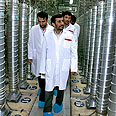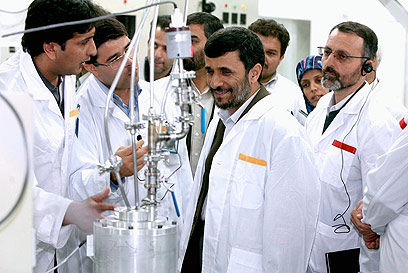
Iran has begun installing advanced centrifuges at its main uranium enrichment plant, a UN nuclear report said on Thursday, a defiant step likely to anger world powers ahead of a resumption of talks with Tehran next week.
In a confidential report, the International Atomic Energy Agency (IAEA) said 180 so-called IR-2m centrifuges and empty centrifuge casings had been hooked up at the plant near the central town of Natanz. They were not yet operating.
Related stories:
- Diplomats: Iran starts upgrade of nuclear site
- Kerry: US, allies working to prevent nuclear Iran
- MP: Iran will never shut down Fordo enrichment plant
If launched successfully, such machines could enable Iran to significantly speed up its accumulation of material that the West fears could be used to devise a nuclear weapon. Iran says it is refining uranium only for peaceful energy purposes.
The deployment of the new centrifuges underlines Iran's continued refusal to bow to Western pressure to curb its nuclear program, and may further complicate efforts to resolve the dispute diplomatically without a spiral into Middle East war.

Ahmadinejad in Natanz plant (Photo: EPA)
Iran's installation of new-generation centrifuges would be "yet another provocative step," US State Department spokeswoman Victoria Nuland said in Washington.
White House spokesman Jay Carney warned Iran that it would face further pressure and isolation if it fails to address international concerns about its nuclear programme in the Feb. 26 talks with world powers in the Kazakh city of Almaty.
Britain's Foreign Office said the IAEA's finding was of "serious concern". Israeli Prime Minister Benjamin Netanyahu's office said the report "proves that Iran continues to advance swiftly towards the red line" that he laid down last year.
Six world powers and Iran are due to meet for the first time in eight months in Kazakhstan on February 26 to try again to break the impasse but analysts expect no real progress toward defusing suspicions of an Iranian quest for nuclear weapons capability.
In a more encouraging sign for the powers, however, the IAEA report said Iran in December resumed converting some of its uranium refined to a fissile concentration of 20 percent to powder for the production of reactor fuel.
That helped restrain the growth of Iran's higher-grade uranium stockpile since the previous report in November, a development that could buy more time for diplomacy and delay possible Israeli military action.
The report said Iran had increased to 167 kg (367 pounds) its stockpile of 20 percent uranium - a level it says it needs to make fuel for a Tehran research reactor but which also takes it much closer to weapons-grade material if processed further.
Bushehr shutdown
One diplomat familiar with the report said this represented a rise of about 18-19 kg since the November report, a notable slowdown from the previous three-month period when the stockpile jumped by nearly 50 percent after Iran halted conversion.
About 240-250 kg of 20 percent enriched uranium is needed for one atomic bomb if refined to a high degree.
Israel, which has warned it might bomb arch-enemy Iran's nuclear sites as a last resort, last year gave a rough deadline of mid-2013 as the date by which Tehran could have enough higher-grade uranium to produce a single atomic bomb.
But a resumption of conversion, experts say, means the Israeli "red line" for action can be postponed.
Iran resumed converting higher-grade enriched uranium for fuel production in December and had since fed 28.3 kg of the material for this stated purpose, the report said.
Refined uranium can fuel nuclear energy plants, which is Iran's stated aim, or provide the core of an atomic bomb, which the United States and Israel suspect may be its ultimate goal.
The report further said that "extensive" activities - an allusion to clean-up and renovations - at Iran's Parchin military site would seriously undermine an IAEA investigation to determine whether explosives tests relevant to nuclear weapons was done there. Iran has so far refused access to Parchin.
Iran had informed the UN agency during an inspection of the Bushehr nuclear power plant in mid-February that the reactor was shut down, the report added, giving no details. The Russian-built plant on Iran's Gulf coast is the Islamic state's first nuclear energy station, but has been plagued by delays.
- Receive Ynetnews updates
directly to your desktop















